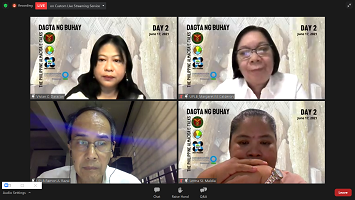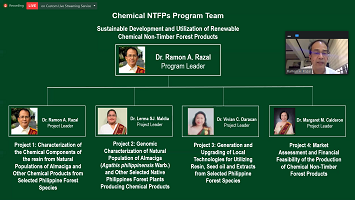 A webinar series aimed to gather insights from the resin tapping communities on the concurring issues and problems faced by the Philippine almaciga resin industry was held via Zoom and Facebook Live on June 15 and 17, 2021.
A webinar series aimed to gather insights from the resin tapping communities on the concurring issues and problems faced by the Philippine almaciga resin industry was held via Zoom and Facebook Live on June 15 and 17, 2021.
The Philippine Council for Agriculture, Aquatic and Natural Resources Research and Development of the Department of Science and Technology (DOST-PCAARRD) partnered with the University of the Philippines Los Baños College of Forestry and Natural Resources (UPLB-CFNR) and the University of the Philippines Los Baños Foundation, Inc. (UPLBFI) in the conduct of the said webinar series to share and validate the results of the PCAARRD-funded initiative, “Sustainable Development and Utilization of Renewable Chemical Non-Timber Forest Products (Chemical NTFP Program),” to resin tappers and other stakeholders.
More than 160 participants composed of representatives from the resin tapping communities, traders, and industry representatives participated in the webinar titled, “Dagta ng Buhay: Philippine Almaciga e-talks.”
According to the Food and Agriculture Organization, almaciga is one of the timber species that is endemic to the Philippines. It has been highly commercialized and traded for its resin, also known as Manila copal, since the 1900s.
UPLB Chancellor Jose V. Camacho underscored in his welcome message the importance of collaborative work among tappers and stakeholders to achieve a flourished almaciga industry, enriched communities, and sustainably developed natural resources of the country.
One of the most pressing problems raised during the first day was the lengthy and complicated tapping permit application procedures. The program team confirmed that there are ongoing initiatives in assessing the permitting process considering the concerns of the tapping community. Dr. Ramon A. Razal, program leader, anticipates that the tapping community would benefit from the result of the research initiative.
CFNR Dean Marlo D. Mendoza highlighted on the second day the essence of the promotion, conservation, and sustainable use of almaciga in producing competitive green products that minimize forest disturbances. Likewise, Mendoza expressed his hopes for forging partnerships among resin tapping communities, government agencies, industries, and the academe with the conduct of the said webinar.
 Razal emphasized the importance of communicating these findings to the resin tappers and their enablers, industry sector, and policymakers. He added that his team envisions contributing to more sustainable management and protection of the country’s almaciga resin resources through this webinar.
Razal emphasized the importance of communicating these findings to the resin tappers and their enablers, industry sector, and policymakers. He added that his team envisions contributing to more sustainable management and protection of the country’s almaciga resin resources through this webinar.
The outputs of the four project components were presented during the second part of the webinar by the following project leaders: Drs. Ramon A. Razal, Lerma SJ. Maldia, Vivian C. Daracan, and Margaret M. Calderon.
Razal gave an overview of the project, “Characterization of the Chemical Components of the Resin from Natural Populations of Almaciga and other Chemical Products from Selected Philippine Forest Species.”
Maldia discussed project 2, “Genomic Characterization of Natural Population of Almaciga (Agathis philippinensis Warb.) and Other Selected Native Philippine Forest Plants Producing Chemical Products.” Finally, Daracan and Calderon presented the outputs of the projects, “Generation and Upgrading of Local Technologies for Utilizing Resin, Seed oil, and Extracts from Selected Philippine Forest Species and Market Assessment” and “Financial Feasibility of the Production of Chemical Non-Timber Forest Products, respectively.”
The strategic partnership of DOST-PCAARRD with UPLB-CFNR and UPLBFI supports the priorities of the Council under the biodiversity R&D roadmap. The Council provides augmentation funds to qualified professional/scientific and academic organizations that pursue activities supporting the Council’s advocacies, banner programs, and goals.
